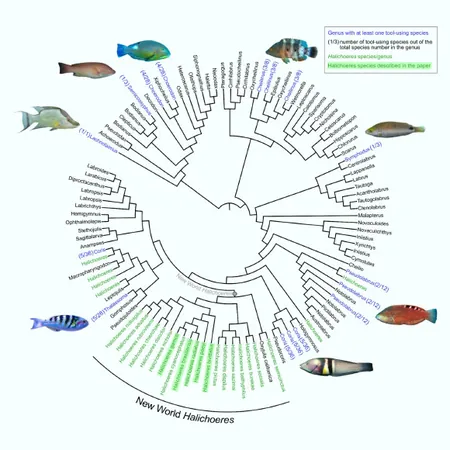
Remarkable Discovery: Tool Use Observed in Wrasses Paves the Way for Fish Intelligence Research
2025-04-07
Author: Sarah
Introduction
A groundbreaking study has unveiled that several species of wrasses, vibrant reef fish known for their stunning colors and complex behaviors, have demonstrated the ability to use tools—a behavior previously attributed mainly to humans and a select few animal species.
Understanding Tool Use
Tool use, defined as the use of an external object to carry out a specific task, has been identified in diverse animals, including primates, birds, octopuses, and various insects. Yet, until now, fish have remained largely unexplored territory in this fascinating area of research. The recent findings shed light on this gap, particularly through the use of "anvils"—hard surfaces upon which these fishes strike their prey items, such as sea urchins or bivalves, to break them open for feeding.
Citizen Science Initiative: Fish Tool Use
In a citizen science initiative called Fish Tool Use, marine biologists gathered 16 new observations involving five species from the New World Halichoeres group. This includes the first-ever evidence of anvil use in Halichoeres brasiliensis, Halichoeres poeyi, and Halichoeres radiatus, along with the initial video documentation showcasing this behavior in Halichoeres garnoti and Halichoeres bivittatus. The observations significantly extend the known range of tool use in wrasses to the western Atlantic, presenting a fascinating peek into the cognitive capabilities of these fish.
Scientific Insights and Implications
Dr. Juliette Tariel-Adam, the lead author and researcher from Macquarie University, emphasized, "Tool use is typically associated with humans, but these behaviors prove that fish possess intelligence that often goes unrecognized." The study not only highlights the inventive behaviors of these species but also suggests that tool use may be more widespread among fishes than previously understood.
Evolutionary Perspectives
The implications of this research extend beyond just wrasses. The discovery poses important questions about the evolution of intelligence and the adaptability of various species, raising curiosity as to why not all animals utilize tools. Fish represent the most diverse group of vertebrates in terms of species and ecological adaptations, which could provide further insights into the evolutionary pathways leading to tool utilization.
Reconsidering Fish Intelligence
Professor Culum Brown, the senior author of the study, remarked, "This research adds significant weight to our understanding of fish intelligence, illustrating flexible and dexterous tool use. It compels us to reconsider the cognitive abilities of fish and their capacity for problem-solving."
Conclusion
The findings, published in the journal Coral Reefs, showcase an exciting new frontier in fish research, reinforcing that intelligence and problem-solving skills might not be a privilege of higher mammals, but rather a remarkable trait shared across the animal kingdom.
As researchers continue to probe these revelations, one thing is clear: the ocean may be home to creatures with far more cunning than we ever imagined.




 Brasil (PT)
Brasil (PT)
 Canada (EN)
Canada (EN)
 Chile (ES)
Chile (ES)
 Česko (CS)
Česko (CS)
 대한민국 (KO)
대한민국 (KO)
 España (ES)
España (ES)
 France (FR)
France (FR)
 Hong Kong (EN)
Hong Kong (EN)
 Italia (IT)
Italia (IT)
 日本 (JA)
日本 (JA)
 Magyarország (HU)
Magyarország (HU)
 Norge (NO)
Norge (NO)
 Polska (PL)
Polska (PL)
 Schweiz (DE)
Schweiz (DE)
 Singapore (EN)
Singapore (EN)
 Sverige (SV)
Sverige (SV)
 Suomi (FI)
Suomi (FI)
 Türkiye (TR)
Türkiye (TR)
 الإمارات العربية المتحدة (AR)
الإمارات العربية المتحدة (AR)